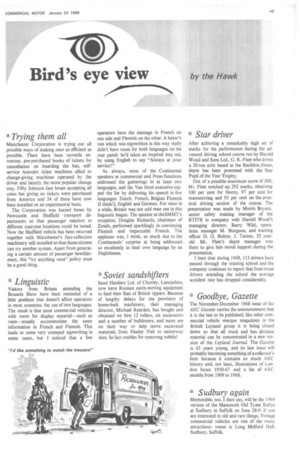* Trying them all
Page 47

If you've noticed an error in this article please click here to report it so we can fix it.
Manchester Corporation is trying out all possible ways of making omo as efficient as possible. There have been turnstile entrances, pre-purchased books of tickets for cancellation on boarding the bus, selfservice Autoslot ticket machines allied to change-giving machines operated by the driver and latterly the more popular change tray. Fifty Johnson fare boxes accepting all coins but giving no tickets were purchased from America and 34 of these have now been installed on an experimental basis.
The Corporation was loaned buses by Newcastle and Sheffield transport departments so that passenger reaction to different staircase locations could be tested. Now the Sheffield vehicle has been returned together with Manchester's fare-collection machinery still installed so that those citizens can try another system. Apart from generating a certain amount of passenger bewilderment, this "try anything once" policy must be a good thing.
* Linguistic
Visitors from Britain attending the Brussels Show have been reminded of a little problem that doesn't affect operators in most countries: the use of two languages. The result is that most commercial vehicles with room for display material—such as vans—usually accommodate the same• information in French and Flemish. This leads to some very cramped signwriting in some cases, but I noticed that a few
operators have the message in French on one side and Flemish on the other. A baker's van which was signwritten in this way really didn't have room for both languages on the rear panel: he'd taken an inspired way out, by using English to say "Always at your service!"
As always, most of the Continental speakers at commercial and Press functions addressed the gatherings in at least two languages, and the Van Hool executive topped the list by delivering his speech in five languages: Dutch, French, Belgian Flemish (I think!), English and German. For once in a while, Britain was not odd man out in this linguistic league. The speaker at the SMMT's reception, Douglas Richards, chairman of Zenith, performed sparklingly in convincing Flemish and impeccable French. The applause was, I think, as much due to the Continentals' surprise at being addressed. so excellently in their own language by an Englishman. .
* Soviet sandshifters
Sand Hauliers Ltd. of Chorley, Lancashire, now have Russian earth-moving equipment to feed their fleet of British tippers. Because of lengthy delays for the provision of home-built machinery, their managing director, Michael Bearden, has bought and obtained on hire 12 rollers, six excavators and a number of bulldozers, and more are on their way to help move excavated materials from Healey Nab to motorway sites. In fact roubles for removing rubble!
* Star driver
After achieving a remarkably high set of marks for his performance during the advanced driving school course run by Harold Wood and Sons Ltd., G. R. Fleet who drives a 30-ton artic based at the Basildon, Essex, depot has been presented with the Star Pupil of the Year Trophy.
Out of a possible maximum score of 300, Mr. Fleet notched up 292 marks, obtaining 100 per cent for theory, 97 per cent for manoeuvring and 95 per cent on the practical driving section of the course. The presentation was made by Morris Bryant, senior safety training manager of the RTITB in company with Harold Wood's managing director, Barry Wild, operations manager M. Sturgeon, and training officer D. G. Bolton. J. Turner, 35 yearold Mr. Fleet's depot manager was there to give him moral support during the presentation.
I hear that during 1968, 113 drivers have passed through the training school and the company continues to report that from those drivers attending the school the average accident rate has dropped considerably.
* Goodbye, Gazette
The November-December 1968 issue of the AEC Gazette carries the announcement that it is the last to be published; like other commercial vehicle marque magazines in the British Leyland group it is being closed down so that all truck and bus division material can be concentrated in a new version of the Leyland Journal. The Gazette is 43 years young, and its last issue will probably becoming something of a collector's item because it contains so much AEC history and, not least, illustrations of London buses 1910-67 and a list of AEC models from 1909 to 1968.
* Sudbury again
Memorable, too, I dare say, will be the 1969 version of the Mammoth Old Tyme Rallye at Sudbury in Suffolk on June 28-9, if you are interested in old and rare things. Vintage commercial vehicles are one of the many attractions: venue is Long Melford Sudbury, Suffolk.








































































































